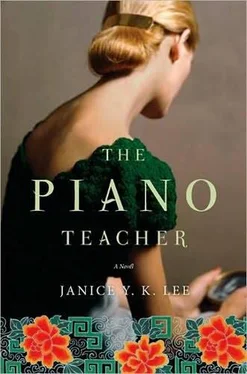“Speak,” says the man.
“The toilets need to be cleaned, and we need supplies to clean them with. Can you provide us with some toilet brushes and cleaning powders? Also, a plunger would be helpful.”
“I will see what I can do.”
“And Mrs. Aitken is eight months pregnant and quite uncomfortable. Could we find a bed for her? She’s in a bed with two other people right now. Everyone else is doubled or tripled up as well.” Except the corpulent secretary from Australia who refuses to give up her bed, but that’s another matter.
“Fine.”
Ueki waves off the request, so Will is not sure if he means yes or no.
“And the food…” Will hesitates.
“Yes?”
“The food is inadequate.”
The short lieutenant studies Will.
“Do you want smoke?” He offers a slim silver case, probably freshly looted from some friend of Trudy’s.
Will takes one and leans over so that Ueki can light it.
“Do you know where I learned the English?”
“No, but it’s very good.” Will tells himself he’s not currying favor, not being obsequious, just honest.
“English missionary came to Japan, taught me for three years.”
“There are lots of missionaries doing good works out there,” Will says, it seems to him, idiotically.
“He was good man. For him, I will try to help you.”
Will says thank you, and then sits for a moment before he realizes he has been dismissed. Getting up, he says thank you again.
Nothing ever comes of the meeting.
It is in this unlikely place, this old brothel, that the detainees find themselves pooling information and tales of what had happened in the days prior. Since they have nothing but time, they gather around, exchanging stories, trying to piece together a coherent history of the final, chaotic days before the surrender.
Regina Arbogast, a delicate-faced socialite who arrived at the parade ground in a rickshaw and seven trunks, six of which she was forced to let her servants bring back home, is full of stories of atrocity that happened not to her but to friends of friends of people she knew. She is full of opinions and appropriated outrage.
“The Chinese got the brunt of it really. They’re defenseless, without a proper government to help protect them. They’ve been under our protection for so long, they don’t know what to do. All the girls have been raped, but the Japanese are afraid to touch the English. They know it will come around in the end.”
Regina had been staying at her friend May Gibbons’s house, where they were living in fairly high style until some Chinese gangsters came in and tied them up while they looted the house. She talks incessantly about the jewelry she lost and how she’ll never be able to replace it. Her husband, a successful importer and businessman, finally blows up after she has gone on for a particularly long time.
“For God’s sake, Regina, just shut up and give us some peace. I’ll buy you all the jewels in China after all this is over.”
She looks at her husband balefully and whispers to her friend, Patricia Watson, about how beleaguered she has been and how Reggie has been just impossible throughout. Patricia smiles and looks satisfied. She had, quite by accident, been spared her valuables at the hotel as she had placed them on the floor in front of her, and the Japanese had refused to bend down to pick them up, and had not bothered to ask her to do it.
A young woman, Mary Cox, says her husband was grabbed by Japanese soldiers and made to clean up after bodies had been dragged along the street, shedding body parts like animals. They had to clear all the bodies before they got in the water supply and spread disease. He came home soaked in blood and bits of decaying flesh and wept before falling on the sofa, exhausted. He was gone the next morning. She hasn’t seen him since. She has a two-year-old boy, Tobias, who trails her, one hand always on some part of his mother, the other holding a toy airplane. He hasn’t spoken since Christmas, she says. Another man, gaunt with worry, says he had been walking with his wife down Carnavon Street, and some soldiers had come and seized her. They held him at gunpoint while they took her away. He hasn’t seen her either. “And yet,” he says, “I used to think the Japanese were the most peaceful, serene people, with their cherry blossom paintings and the elaborate tea ceremony. How can they be so brutal?”
“A soldier is only one part of a country,” Hugh says. “Certainly not representative of an entire people. And wartime makes different animals of us all.”
“How can you say that?” Regina Arbogast cries. “They are each one as brutal as the other, as far as I’m concerned. You would never see a British soldier behave the way these animals have behaved to us.”
“You are, of course, right, my dear,” Hugh says, ending the conversation.
The next day, Mickey Wallace comes into the lobby where some of them are sitting listlessly. He is bleeding from the ears, his eyes already starting to swell blue and shut. He had been on the roof, looking down, when some Japanese soldiers saw him. They stormed up to him and beat him bloody because nobody is to look down on the Japanese. Only they are allowed to look down on others. This, their enemies’ peculiar preoccupation with placement and particularly with height, because of their generally smaller stature, becomes ingrained in all of the prisoners until many years after the war is over, when they automatically check who is standing where, on what step or from what position.
And the random cruelty makes them all wary. A soldier, drunk and angry about his gambling losses, strikes a small child on the way to his post. The little boy has a fractured nose and loses three teeth. A higher-up Jap spirits him away with his mother, and they are never seen again. Evidence gone. On his way up the stairs, Will looks down at the alley between the hotel and the adjacent building. He sees a body covered by a blanket, a shock of fair hair, too high up to see who it is. When he goes down, the body is gone. He wonders if he imagined it, knows he did not. Another day Trotter comes to him, says sotto voce, “I wonder if I’m going mad. I was on the balcony having a smoke, and in an alley between buildings, I could have sworn I saw a man beheaded by two others.” His voice trembles but his face is calm. “I saw the spurt of blood, the man falling down from his knees, hands tied behind his back. I could have sworn I saw it.” How can one stand it? “And then I left. I didn’t want to see the cleanup.” How does one stay sane?
There are small insults in addition to the large. A plague of the most enormous mosquitoes Will has ever seen, caused by inadequate drainage. His body is spotted with their bites, red, raised, and angry. When he swats at them, they explode into red bursts of blood, gorged on their many victims. Pests crawl into their thin mattresses, which they try, unsuccessfully, to combat by immersing the iron bed legs in bowls filled with camphor and water. Weevils in the rice. Stinky, warm water they have to hold their noses to drink. The attendant diarrhea that comes from drinking the water, until they gather together some tins and boil it first. Then the burned tongues from drinking the newly sterilized water as fast as it comes off the flame, because they are so thirsty a burned tongue seems small penance.
And then they can look outside the dirty windows to the sight of Japanese soldiers, drunk and vomiting on the sidewalks, being held up by Chinese prostitutes, as they celebrate their victory. Sometimes an unfortunate coolie is dragged in to clean up the mess, but more often it is left to rot in the street. Will thanks God it is not high summer, when the odor would intensify ten times as quickly.
Читать дальше












